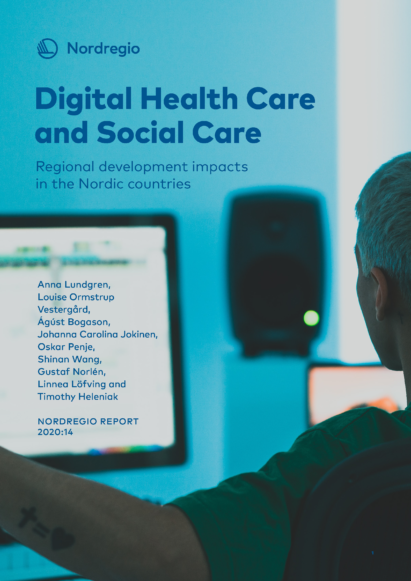Health care and social care are not only important aspects of the Nordic welfare state model. The development of those sectors also has an important impact on the regional development and sustainability
(economically, socially and environmentally) in the Nordic Region. The use of digital solutions in both sectors is increasing across all the Nordic countries. However, in relation to the ambitious goals set out in national digitalisation and eHealth strategies, digitalisation in health care and social care can be seen to have been developing at a relatively moderate pace.This research is part of the Health care and care with distance-spanning solutions project initiated and funded by the Nordic Council of Ministers.
The aim of this research has been to explore the effects and potential benefits to regional development, and to address the various obstacles
facing digitalisation in health care and social care throughout the Region.
In addition to literature reviews of the different health care systems, digitalisation in the health care and social care sectors and how these
link to regional development, case studies have been conducted in one region and municipality in each of the Nordic Region’s five states (Sweden,
Norway, Denmark, Finland and Iceland) and in two of the self-governing territories (the Faroe Islands and Greenland). These case studies include interviews with senior management, project leaders and health care and social care workers.An accessibility analysis has also been conducted with a view to understanding how access to health care and social care can be improved by digital solutions in these sectors.
21 October 2020
Digital Health Care and Social Care – Regional development impacts in the Nordic countries
Home Publications Digital Health Care and Social Care – Regional development impacts in the Nordic countries
Publication facts
Digital Health Care and Social Care – Regional development impacts in the Nordic countries
Publication date: 21 October 2020
Nordregio Report 2020:14
ISBN: 978-91-8001-001-6
ISSN: 1403-2503
DOI: http://doi.org/10.6027/R2020:14.1403-2503Authors
Anna Lundgren, Louise Ormstrup Vestergård, Ágúst Bogason, Johanna Carolina Jokinen, Oskar Penje, Shinan Wang, Gustaf Norlén, Linnea Löfving and Timothy Heleniak
Related Staff

Anna Lundgren
Senior Research Fellow

Louise Ormstrup Vestergård
Research Fellow (on parental leave)

Ágúst Bogason
Senior Research Advisor

Johanna Jokinen
Senior Research Fellow / GIS

Oskar Penje
Senior Cartographer / GIS Analyst

Shinan Wang
Cartographer/GIS Analyst

Gustaf Norlén
Senior Analyst / Cartographer

Linnea Löfving
Senior Research Advisor (on parental leave)

Timothy Heleniak
Senior Research Fellow
Related Research Projects
Health care and care with distance-spanning technologies, e-health and digitalisation
Accessibility to Health Services in Iceland
The organisation of social services and care in sparsely populated areas in the Nordics
Related Publications
Digital inclusion in distance spanning health solutions – Insights from four model regions
Can we break the isolation? Experiences of digital tools in elderly care in three Swedish municipalities
Recruitment and retention in the welfare sector: Nordic good practice
In-depth accessibility study – Regional development impacts in the Nordic countries
KEEP DISCOVERING
Recent publications
Below are the latest research results produced and published by Nordregio, on regional development and planning in the Nordic Region.




